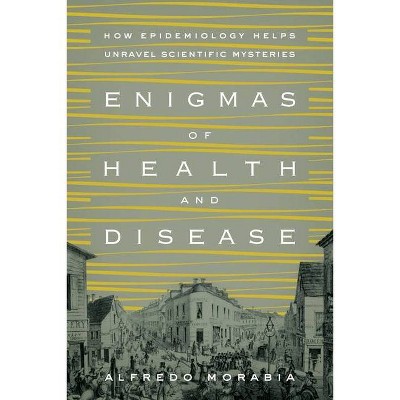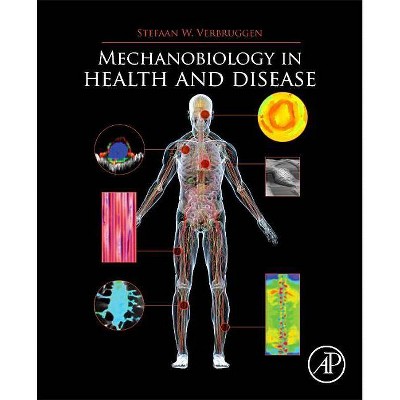Enigmas of Health and Disease - by Alfredo Morabia (Paperback)

Similar Products
Products of same category from the store
AllProduct info
<p/><br></br><p><b> About the Book </b></p></br></br><p>Alfredo Morabia's account of epidemiology's role in the development of measures to identify, prevent, and treat disease sheds new light on the historical triumphs of epidemiological research. By drawing from both historical and contemporary sources, Morabia provides the tools to differentiate health beliefs from health knowledge, addressing topics as varied as the H1N1 swine flu epidemic, breast cancer, the effects of aspirin, and the link between cigarettes and lung cancer.</p><p/><br></br><p><b> Book Synopsis </b></p></br></br><p>This book is the principal account of epidemiology's role in the development of effective measures to identify, prevent, and treat diseases. Throughout history, epidemiologists have challenged conventional knowledge, elucidating mysteries of causality and paving the way for remedies. From the outbreak of the bubonic plague, cholera, and cancer to the search for an effective treatment of AIDS and the origins of Alzheimer's disease, epidemiological thought has been crucial in shaping our understanding of population health issues.</p><p>Alfredo Morabia's lucid retelling sheds new light on the historical triumphs of epidemiological research and allows for contemporary readers, patients, and nontechnical audiences to make sense of the immense amount of health information disseminated by the media. By drawing from both historical and contemporary sources, Morabia provides the reader with the tools to differentiate health beliefs from health knowledge. The book covers important topics, including the H1N1 swine flu epidemic, breast cancer, the effects of aspirin, and the link between cigarettes and lung cancer.</p><p/><br></br><p><b> Review Quotes </b></p></br></br><br>A fascinating walk through the history of diseases, epidemics and treatments and those who played an instrumental role in solving their mysteries through sometimes very rudimentary population stories... Captivating...--Preventative Medicine<br><br>In one volume, the author succeeds in giving us an inspiring history of the discipline, a mini-textbook, and an essay on epidemiology's origins and destiny.--American Journal of Epidemiology<br><br>This book is aimed at a general audience, but there's plenty here for medical experts too.--Cosmos<br><br><i>Enigmas of Health and Disease</i> is a rare treasure. It seamlessly combines historical insight with sharply drawn observations about present-day quantitative population health science. In many ways it evinces the inductive intelligence that characterizes the best of epidemiology. In so doing it sets a high bar: it both illuminates sometimes difficult population health topics for the engaged reader and challenges working public health scientists to clarify and sharpen their thinking.--Sandro Galea, Mailman School of Public Health, Columbia University<br><br><i>Enigmas of Health and Disease</i> is an exceptionally informative and engaging book that covers landmark events in the history of epidemiology while explaining the discipline's concepts and strategies in simple and elegant language. Among this book's most endearing features are its leitmotifs: the emphasis on the importance of group comparisons for causal inference (in contrast with focus on individuals) and the interface of epidemiology with public health and medicine.--Moyses Szklo, Johns Hopkins University<br><br>Alfredo Morabia uses his extraordinary knowledge of epidemiology to illuminate the public interest in this elegant science while clearly explaining its concepts, methods, and uses. He presents the struggles and achievements of his discipline in their broad historical and societal contexts. Morabia endeavors to persuade general readers and people in other disciplines to think as epidemiologists do and reminds his colleagues of the challenge, significance, and beauty of doing epidemiology.--Daniel M. Fox, president emeritus, Milbank Memorial Fund<br><br>An exceptionally informative and engaging book that covers landmark events in the history of epidemiology.... Highly recommended.--Moyses Szklo "European Journal of Epidemiology "<br><br>In addition to being a practicing epidemiologist, Alfredo Morabia is an accomplished historian of epidemiology and a gifted teacher. These qualities and accomplishments give him an unusual vantage point for introducing epidemiology to general audiences through this inspired book, which is unlike any other introduction to epidemiology. By eschewing the technical terminology of epidemiology and focusing instead on what he argues is the essence of the method/discipline--that is, 'group comparisons'--Morabia conveys, in an informative and readable way, the distinctive and powerful logic of epidemiology.--Geoffrey Kabat, Albert Einstein College of Medicine, author of <i>Hyping Health Risks: Environmental Hazards in Everyday Life and the Science of Epidemiology.</i><br><br>It entertains. It illuminates forgotten or little known ways medicine was practiced in the past.... [<i>Enigmas of Health and Disease</i>] is a book worth reading for its many anecdotes, its extensive footnotes and references, and its message that epidemiology should be learned in high school and college undergraduate courses.--Elof Axel Carlson "Quarterly Review of Biology "<br><p/><br></br><p><b> About the Author </b></p></br></br>Alfredo Morabia is an MD, board certified in internal and occupational medicine, and professor of epidemiology at the Barry Commoner Center, Queens College, City University of New York, and at the Mailman School of Public Health, Columbia University.
Price History
Price Archive shows prices from various stores, lets you see history and find the cheapest. There is no actual sale on the website. For all support, inquiry and suggestion messagescommunication@pricearchive.us



















